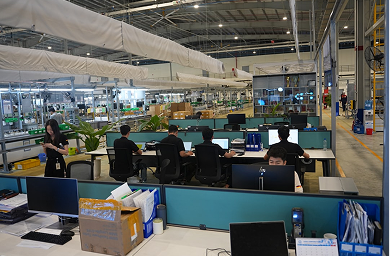In the context of a globalized economy and increasing demand for human resources in the electronics and semiconductor sectors, the concept of “labor importation” is becoming an increasingly significant strategy. Aimed at attracting highly skilled Vietnamese labor from abroad, “labor importation” is considered a sustainable solution to improve the supply of high-quality human resources for FDI enterprises in Vietnam.
1. The Concept of “Labor Importation” and Its Necessity in the Current Context
Labor importation is no longer simply about seeking cheap labor from other countries. Instead, it refers to attracting skilled and qualified human resources, including overseas students and those working abroad, who can better meet the quality demands of FDI enterprises. This is particularly important in the electronics and semiconductor sectors, where the quality of labor and the rapid pace of technological advancement require highly skilled workers.
The latest data from the 2023 report by the Ministry of Labor, Invalids, and Social Affairs of Vietnam shows that the labor shortage rate in the electronics and semiconductor sectors stands at 15-20%, especially in highly skilled labor. Foreign-invested companies in Vietnam, particularly from Taiwan, China, the USA, Japan, and South Korea, are constantly searching for talents who meet the sector’s rigorous standards. In this context, professional HR services from companies like GLA HR become a preferred choice for providing high-quality labor.
2. Opportunities and Challenges in Vietnam’s Electronics and Semiconductor Industries
The rapid development of the electronics and semiconductor sectors has created thousands of job opportunities in Vietnam. According to data from 2024, the demand for labor at major industrial parks in Bac Ninh, Thai Nguyen, and Hai Phong is growing by 25% per year. However, the quality of the workforce is inconsistent, particularly in roles requiring high levels of technical expertise.

Moreover, the semiconductor sector faces similar challenges, as the local labor supply cannot fully meet the increasingly stringent requirements of foreign investors. To address this issue, the strategy of labor importation targets not only general laborers but also skilled and experienced professionals from developed countries, creating opportunities for Vietnamese workers to learn, enhance their skills, and make long-term contributions to the industry’s growth.
3. Advantages of “Labor Importation” for FDI Enterprises
Labor importation offers several practical benefits for FDI companies operating in Vietnam, from ensuring a stable labor supply to enhancing the quality and productivity of the workforce. Additionally, attracting skilled labor from abroad allows local workers to access modern technologies and acquire new skills, which not only strengthens the competitiveness of companies but also promotes sustainable economic growth.

- Ensuring a stable labor supply: Meeting labor demand promptly amid intense competition.
- Improving product quality: Skilled labor helps increase product quality, reduce errors, and minimize defective rates.
- Enhancing reputation and brand: Stability in production and a commitment to quality help businesses build a strong reputation and brand in the international market.
4. The Future of the “Labor Importation” Strategy in Vietnam
The Vietnamese labor importationstrategy, particularly when flexibly applied to the electronics and semiconductor sectors, is not only a short-term solution but also a sustainable approach for the industrial development of Vietnam. With support from professional HR service companies like GLA HR, FDI enterprises can be assured of high-quality human resources, while Vietnamese workers have opportunities to enhance their skills, contributing significantly to the country’s industrialization and modernization goals.
With the continuous evolution of the labor market, attracting and retaining skilled labor from abroad will establish a solid foundation for Vietnam’s industrial sector. This is the time for businesses and investors to focus more on building a sustainable labor importation strategy to gain a competitive advantage and ensure long-term development in this promising industry.hập khẩu lao động một cách bền vững, tạo lợi thế cạnh tranh và đảm bảo sự phát triển lâu dài trong ngành công nghiệp đầy tiềm năng này.
Labor importation is not just a trend but has become a core element driving the growth of industries like electronics and semiconductors in Vietnam. With the substantial benefits this strategy brings, FDI companies can optimize production processes, improve product quality, and create a strong competitive advantage. At the same time, it is an opportunity for Vietnamese workers to develop and integrate into the global value chain.
Join our Zalo group for HOT JOB opportunities: https://zalo.me/g/osiedw964


